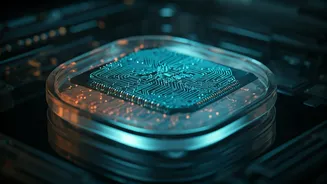Brain-Computer Interface
Brain-computer interfaces (BCIs) are rapidly evolving and becoming increasingly sophisticated. These systems, designed to establish a direct communication
pathway between the brain and an external device, are opening up new possibilities for medical treatments and enhancing human capabilities. One notable advancement involves the development of injectable brain chips. These tiny devices, once implanted, can monitor and potentially even stimulate brain activity. The purpose is to treat neurological disorders and improve cognitive functions. The implications of BCIs are far-reaching, from helping patients with paralysis to improving memory and learning. As technology advances, ethical questions arise concerning data privacy and the potential for misuse. The ongoing research into BCIs is shaping the future of human-computer interaction, bringing us closer to a world where technology and the human brain are deeply integrated.
Injectable Brain Chips
Injectable brain chips represent a significant leap forward in BCI technology. Unlike traditional, invasive methods, these microchips can be inserted into the brain with minimal surgical procedures. This innovative approach makes them potentially safer and easier to implement. Once implanted, these tiny devices can monitor brain activity and transmit data wirelessly. This ability allows researchers and medical professionals to gather real-time information about brain function. These chips could revolutionize the treatment of neurological conditions, offering new avenues for managing diseases such as Parkinson's and Alzheimer's. The portability and ease of use of injectable brain chips have led to intense ethical scrutiny. Privacy advocates raise concerns regarding data security and the potential for unauthorized access to sensitive neurological information. As the technology matures, ensuring data security and privacy is critical to gaining public trust and preventing misuse.
Ethical Considerations
The rapid advancement of neurotechnology brings forth important ethical considerations that must be carefully addressed. As injectable brain chips become more prevalent, questions surrounding data privacy and security are paramount. Brain data is highly sensitive, and any unauthorized access could have severe consequences, including discrimination and manipulation. Another challenge is informed consent, where patients must fully understand the risks and benefits before undergoing such procedures. Ensuring equitable access to these technologies is vital to prevent disparities in healthcare and opportunities. The potential for misuse, such as using BCIs for cognitive enhancement or surveillance, necessitates stringent regulations. Establishing ethical guidelines is essential to protect individuals' rights and promote responsible innovation in the field. To avoid negative consequences, ethical frameworks must evolve with the technology. Collaboration between researchers, ethicists, policymakers, and the public is vital to address the challenges and guide the responsible development and use of neurotechnology.
Future Implications
The long-term implications of injectable brain chips are immense, promising transformative changes in medicine, human interaction, and society. The potential for these devices to enhance cognitive functions and treat neurological disorders could lead to substantial improvements in quality of life for millions of people. As BCIs develop, they could alter how humans interact with technology, creating new forms of communication and control. This could lead to a future where brain-computer interfaces are integrated into everyday life. There are also potential risks related to the evolution of BCIs. Ensuring that these technologies are developed and used ethically is crucial. This requires ongoing dialogue, careful regulation, and collaboration between various stakeholders. The future of injectable brain chips hinges on balancing the benefits and addressing the ethical challenges. This will involve promoting human well-being and preventing misuse, creating a society that can benefit from the incredible possibilities of neurotechnology.















